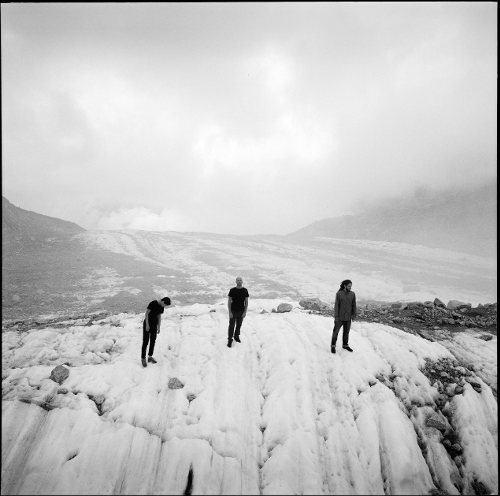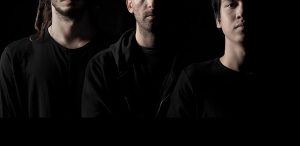Swiss acoustic trio Plaistow come to Band on the Wall on Friday 29th January, playing a free entry concert as part of our Band on the Wall Recommends series, in which we present artists we believe you truly have to hear. Forming in 2007, the band have crafted a unique trio sound which pushes the limits of their acoustic instruments, and references the sounds and styles of jazz, techno, minimalism and much more, with clever compositions and sound creation techniques. Ahead of the concert, we spoke to pianist and composer Johann Bourquenez about the trio’s sound as well as their latest album ‘Titan’ and their plans for 2016.
Within the trio you keep the onus on the sound and use of the acoustic instruments you play, and you’re able to create incredibly varied sounds with your instruments. What inspires the band to play and compose in such a way?
One of the first constitutive concepts of Plaistow was to rediscover the movement and the presence of the musicians on stage. Before this band I spent several years experimenting with electronic machines and computers, and was struck by their contrast to the piano (and all instruments) as with machines I could launch a big feedback loop and then stand without moving, with a big noise wall going on, or use an arpeggiator and leave some loop going on, whereas with the piano I have to move to make a sound, if I don’t move – even a tiny little bit – then nothing happens.
As a group you’re all excellent a musicians, are you formally trained in music or have you learned in alternative ways?
We all had formal training, at least in the begining. I had jazz piano lessons, then I studied in Toulouse Jazz school, then after some years playing more and more electronics, and finally moved to Geneva and began to practice piano seriously and exclusively, on my own and for hours every day. I think there was a turning point in 2011 during some kind of retreat, when I acknowledged some special techniques I had developed and used, such as the way I create harmonic textures with staccatos on the Keyboard, or the cutoff and LFO-like sound modifications when I use string’s harmonic points inside the piano.
Cyril also has a wealth of experience with free improvisation and textures (with Diatribes and the IMO orchestra), but he started with ‘regular’ drums lessons as a teenager. Vincent is the more formal jazzman in the band. He recently validated his bachelor at the Basel High School of Music, and will probably go for a Masters degree in Copenhagen. That said, he also experiments with electronics, and will release a 10 inch record (named 10inch) by the end of February on Svakt records.
With piano, upright bass and drums, your line-up matches that of many classic modern jazz trios, but your music is quite an evolution from that sound. Is that music important to you as a group, or do you look elsewhere when writing and listening?
Since the begining the idea was to use those instruments and the sound of the trio as a medium to chanel all our ideas and inspirations (and influences). The ‘problem’ is that we have so many influences – of course Jazz is amongst them, and there are so many forms of jazz (I discovered Jazz at 20 with Keith Jarrett – the Köln concert in the Nanni Moretti’s movie ‘Caro Diaro’, then the Trio albums, Vol. 1 and 2, Changeless – then Thelonious Monk, John Coltrane, then Bill Evans, Miles Davis, Duke Ellington, then Steve Coleman, etc.). But we are also influenced by Techno, Drum ‘n’ bass, Dub, Noise, etc., and oriental musics, and American minimalism, and rock, pop, and so on… it’s impossible to be purely of one style. Everyone is a mix.
Also, it’s difficult to say where inspiration comes from. It can be anything. On Titan, the main inspiration is of course the moons of Saturn. Specifically, while watching pictures and 3D renderings, the epiphanic understanding that all this really exists somewhere in time and space. And actually, relatively near to us.
Your recent LP ‘Titan’ has been incredibly well recieved, and listeners seem to have recognised a progression from your earlier work. Do you feel that to be the case?
Before I started to work on Titan, I felt the band had gained some maturity, and we were at a point where we could do something strong, and not just experiment and guess. In the first years we used to try everything we could think of, but with time I had more and more of an accurate idea of what was going on and what was possible with this band (and maybe what was not!
For this album I also tried to push the compositions and ideas as far as I could, alone, using beatboxes and samples (including of the band itself) beforehand, to propose the demo recordings to the musicians and to work together as a band. This method was successful in that I had clear ideas from the begining till the end of the creation process (from the demo to the mastering), instead of being lost in the middle of everything.
I also did something new: I listened to the old albums, and this gave me a good idea of what I thought it was that I wanted at the time we made it, and what it was really after some years, regarding sound, compositions, how we play, etc.. The whole band is very happy with this album!
What plans do the group have for 2016?
The plans for 2016 are to play and acquire new listeners, especially in Europe. We are somewhat known in Switzerland and Netherlands now, in Russia too (we played several tours across the whole of Russia). In the last few years we have played with great success at London and Berlin’s Jazz Festivals, the idea is to be able to play more and more in the UK, Germany and France. Also, we feel we are at the maximum point of our independent structure (Titan was made and released as an auto-production), so we would be happy to find some label interested to work with us.



